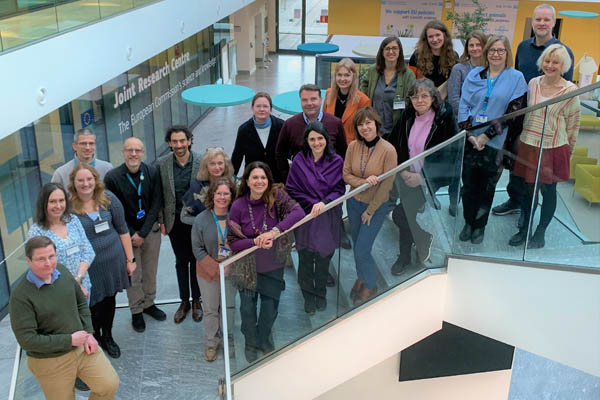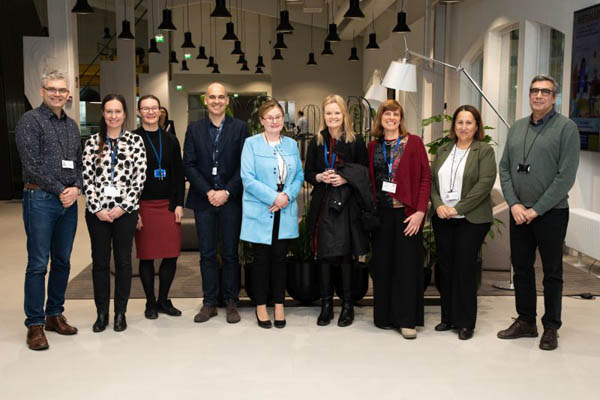EU Work for a Paradigm Shift
A paradigm shift is needed to enforce a decisive ban on animal experiments and establish an animal-free research landscape. This can only succeed if we cooperate with all stakeholders at the European level and implement sustainable solutions. We are working towards this goal by participating in various EU bodies and campaigning for the Europe-wide protection of animals.
Doctors Against Animal Experiments Germany is a member of two major umbrella organisations that operate across the EU: the European Coalition to End Animal Experiments (ECEAE) and the Eurogroup for Animals (EfA). These umbrella organisations can send individuals as representatives to promote animal welfare in bodies of the European Commission and the EU authorities. This is also known as stakeholder work.
Stakeholder Work
Dr. Tamara Zietek, Science Coordinator for Doctors Against Animal Experiments Germany and responsible for work on the European level, represents our umbrella organisations ECEAE and EfA in several stakeholder forums. These stakeholder groups are made up of stakeholders from various institutions, such as representatives of industry associations, research associations and non-governmental organisations (NGOs).
ECVAM: Validation Centre for Animal-Free Research Methods
The ECVAM (European Centre for the Validation of Alternative Methods) Stakeholder Forum is a particularly important body we participate in. ECVAM is part of the JRC (Joint Research Centre) and reports to the European Commission. ECVAM is responsible, amongst other things, for validating animal-free research methods to be used instead of animal experiments for testing chemicals and other substances. In addition, ECVAM conducts outreach, highlighting scientific problems that arise from animal experiments and evaluating non-animal models that offer relevant benefits. For example, ECVAM has published a series of 7 reports that highlight thousands of animal-free research models for particularly relevant areas of medical research. There are, for instance, almost 300 models for respiratory diseases, more than 900 models for breast cancer and some 540 models for neurodegenerative diseases such as Alzheimer’s disease. ECVAM has also drawn up a recommendation this year, clearly advocating the use of animal-free antibodies for research. As a member of the ECVAM Stakeholder Forum, part of our work involves reviewing and commenting on such recommendation documents, or promoting and disseminating of ECVAM’s activities.

Stakeholder meeting at ECVAM in Ispra, Italy, with Dr. Tamara Zietek (2nd from left)
ECHA: Chemicals Safety Authority
The ECHA (European Chemicals Agency) has several stakeholder bodies we participate in. This is important because, unlike the EMA (drug safety authority) and EFSA (food safety authority), the ECHA shows little commitment to implementing animal-free research models. By reviewing documents on new Directives or approval formalities, we can provide pertinent comments or critique. If, for example, animal testing should be required for the approval of certain groups of chemicals, we instead advocate the use of suitable methods that do not involve animal testing. We continue to demand that the ECHA give more priority to (at the very least) reducing animal testing and providing necessary resources for this purpose.

Stakeholder meeting at the ECHA in Helsinki, with Dr. Tamara Zietek (2nd from left)
OECD: Global Harmonisation
It is important not only to enforce the ban on animal testing and the use of animal-free testing methods in Europe, but also to establish and harmonise appropriate measures in countries outside the EU. Amongst other things, this has the goal of preventing animal experiments from being shifted to non-European countries, because the laws there allow them. To this end, ECEAE is a member of the ICAPO (International Council on Animal Protection in OECD Programmes) and ICAPPP (International Council on Animal Protection in Pharmaceuticals), associations of internationally active animal rights organisations. ICAPO and ICAPPP were founded as NGOs to influence OECD guidelines and the International Conference on Harmonisation (ICH). The OECD (Organisation for Economic Co-operation and Development) is an association of 38 member states and issues guidelines for the safety testing of substances for first-time approval. The ICH harmonises worldwide drug approval. As stakeholders in the two bodies, ICAPO and ICAPPP are committed to ensuring that the guidelines issued contain neither animal testing nor the use of animal substances.
A Rocky Road

Meeting with the European Commission on the European Citizens’ Initiative “Save Cruelty Free Cosmetics”
EU stakeholder work is often arduous and does not always produce the results we would like. Nevertheless, it is important to keep an eye on the work of the European institutions and authorities, and to uncover and criticise animal welfare problems, as well es helping to shape solutions wherever possible. There are many MEPs who support our goals and work with us to put pressure on the European Commission. An example of this is the European Citizens’ Initiative “Save Cruelty Free Cosmetics” to keep the ban on animal testing in cosmetics testing and for a cruelty-free Europe. Active European work also resulted in a motion for a resolution on an EU-wide plan to phase out animal testing, which was adopted by the European Parliament in September 2021 with a 97% majority.
Although the road is rocky, much is happening in the area of abolishing animal testing and non-animal research at the EU level, and we will continue campaigning our international partners to achieve this goal as soon as possible.
12.04.2023 Dr. Tamara Zietek
